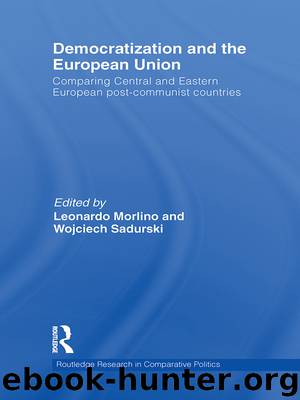Democratization and the European Union by Morlino Leonardo; Sadurski Wojciech;

Author:Morlino, Leonardo; Sadurski, Wojciech;
Language: eng
Format: epub
Tags: Social Sciences
Publisher: Routledge
Published: 2010-05-30T16:00:00+00:00
The EU impact on the CC
Concerning the EU’s influence over the CC’s functioning and organization, only in the 2008 Accession Partnership with Serbia do we find an explicit reference to the CC and its functioning. Among the key short-term priorities, one title lists: ‘Ensure proper functioning of the Constitutional Court’. It is really peculiar that until 2008 the functioning of the CC was never addressed as a priority by the EU. From a formal legal standpoint, the new provisions regarding the composition of the CC, introduced in 2006, were generally welcomed by international actors, namely the EU and the CoE. The Opinion of the Venice Commission about the 2006 Constitution underlined, for example, how the new formal organization of the CC is well balanced and efficient, if adequately implemented.21 Concerning the CC competences, although they were formally expanded, the risk was always the same, i.e. fake implementation of what was formally changed.
Unlike the experiences of other countries described in this book, in Serbia’s case we could not observe examples of Court decisions that explicitly recall EU and international legislation, in particular concerning the interpretation of the laws. We could only observe how, in the past years, the CC recommended to the parliament that some laws be amended in order to bring Serbian legislation in line with international standards. But this has only been expressed in terms of suggestions and recommendations. This was the case in 2003, when the CC made a series of recommendations to change electoral legislation, recommending also some constitutional changes and the way in which the question should be regulated in the new Constitution. The CC also underlined the necessity of bringing the Serbian electoral legislation in line with international standards, mentioning in particular the European convention on the protection of human rights and elementary freedoms and the OSCE guidelines.
In 2005, the CC repeated its recommendation to bring the Law on Associations in line with the Constitution, underlining that the CC had made the same recommendations in 2000 and 2003 as well, without response. The CC also recommended the adoption of relevant by-laws in order to ensure implementation of the Law on the protection of national minorities, underlining that the lack of by-laws is harming the rights of the minorities guaranteed by the law. In general, these recommendations remained unheard.
Concluding, until 2008, the EU influence on this dimension was slightly limited when viewed in light of both the EU approach towards Serbia and the Serbian domestic situation.
Download
This site does not store any files on its server. We only index and link to content provided by other sites. Please contact the content providers to delete copyright contents if any and email us, we'll remove relevant links or contents immediately.
American Kingpin by Nick Bilton(3510)
Future Crimes by Marc Goodman(3374)
The Meaning of the Library by unknow(2388)
Inside the Middle East by Avi Melamed(2233)
Why Nations Fail: The Origins of Power, Prosperity, and Poverty by Daron Acemoglu & James Robinson(2177)
On Tyranny by Timothy Snyder(2130)
Living Silence in Burma by Christina Fink(1984)
Putin's Labyrinth(1902)
The Mastermind by Evan Ratliff(1830)
The Smartest Kids in the World by Amanda Ripley(1686)
Think Like a Rocket Scientist by Ozan Varol(1678)
Law: A Very Short Introduction by Raymond Wacks(1636)
The Rule of Law by Bingham Tom(1594)
It's Our Turn to Eat by Michela Wrong(1593)
Leadership by Doris Kearns Goodwin(1563)
A Dirty War by Anna Politkovskaya(1543)
Philosophy of law a very short introduction by Raymond Wacks(1542)
Social Media Law in a Nutshell by Ryan Garcia & Thaddeus A Hoffmeister(1451)
Civil Procedure (Aspen Casebooks) by Stephen C. Yeazell(1440)
